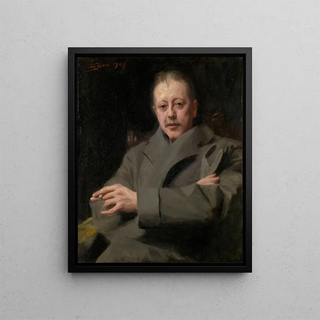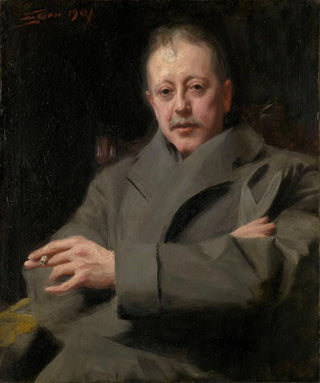Art print | Portrait study of a man - Anders Zorn


View from behind

Frame (optional)
The artwork "Portrait Study of a Man" by Anders Zorn evokes emotional depth and technical mastery that captivate the eye and the mind. In this representation, Zorn takes us into a universe where light and shadow intertwine, revealing not only the personality of the subject but also the artist's unique skill in capturing human essence. This portrait, which almost seems alive, is an invitation to explore the subtleties of the human soul through the lens of painting. The finesse of details and the richness of colors testify to an exceptional craftsmanship, allowing each viewer to feel an intimate connection with the depicted character.
Style and uniqueness of the work
Zorn's style is distinguished by its bold approach and ability to play with light. In "Portrait Study of a Man," the artist uses fluid and expressive brushstrokes that bring the skin to life, while creating a striking contrast between illuminated areas and those plunged into shadow. This technique, reminiscent of plein air painting, captures fleeting moments of life, making each work a true window into the world. The color palette chosen by Zorn, both rich and nuanced, contributes to the vibrant atmosphere of the composition. This portrait is not limited to a simple physical representation; it also evokes emotions, thoughts, and stories, transforming the viewer into a privileged witness of a frozen moment in time.
The artist and his influence
Anders Zorn, an emblematic figure of Swedish painting, established himself on the international art scene thanks to his exceptional talent and unique vision. Born in 1860, he was influenced by the great masters of painting, notably Rembrandt and Velázquez, while developing a style that is his own. Zorn combined tradition and modernity, integrating elements of naturalism while exploring contemporary themes. His work significantly contributed to redefining the portrait at the turn of the 20th century, emphasizing individuality and the psychology of subjects. Zorn's impact is felt not only in Sweden

Matte finish

View from behind

Frame (optional)
The artwork "Portrait Study of a Man" by Anders Zorn evokes emotional depth and technical mastery that captivate the eye and the mind. In this representation, Zorn takes us into a universe where light and shadow intertwine, revealing not only the personality of the subject but also the artist's unique skill in capturing human essence. This portrait, which almost seems alive, is an invitation to explore the subtleties of the human soul through the lens of painting. The finesse of details and the richness of colors testify to an exceptional craftsmanship, allowing each viewer to feel an intimate connection with the depicted character.
Style and uniqueness of the work
Zorn's style is distinguished by its bold approach and ability to play with light. In "Portrait Study of a Man," the artist uses fluid and expressive brushstrokes that bring the skin to life, while creating a striking contrast between illuminated areas and those plunged into shadow. This technique, reminiscent of plein air painting, captures fleeting moments of life, making each work a true window into the world. The color palette chosen by Zorn, both rich and nuanced, contributes to the vibrant atmosphere of the composition. This portrait is not limited to a simple physical representation; it also evokes emotions, thoughts, and stories, transforming the viewer into a privileged witness of a frozen moment in time.
The artist and his influence
Anders Zorn, an emblematic figure of Swedish painting, established himself on the international art scene thanks to his exceptional talent and unique vision. Born in 1860, he was influenced by the great masters of painting, notably Rembrandt and Velázquez, while developing a style that is his own. Zorn combined tradition and modernity, integrating elements of naturalism while exploring contemporary themes. His work significantly contributed to redefining the portrait at the turn of the 20th century, emphasizing individuality and the psychology of subjects. Zorn's impact is felt not only in Sweden






